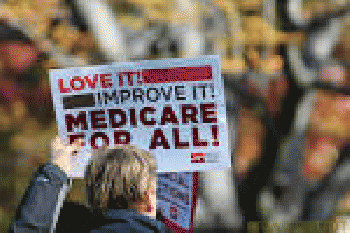From The Nation
Democratic voters overwhelmingly support Medicare for All, yet not all Democratic candidates do.When the Democratic Party's platform committeerejected a proposal for finally establishing a single-payer health-care system in the United States, Michael Lighty of National Nurses United reminded them that 81 percent of Democrats tell pollsters they support a "Medicare for All" reform. "If [single payer] is controversial in this room, it is the only room of Democrats in which it is controversial," the veteran union activist explained.
Lighty was right, and, though his position did not prevail that day, he promised that "the 185,000 registered nurses of National Nurses United will not give up on their patients. They will not give up until we assure health care for all. They will not give up until we have Medicare for All."
Unfortunately, the persistent determination of the Democratic Party's hyper-cautious "strategists" and "leaders" to reject the will of Democratic voters -- and the historical traditions of a party that declared in its 1948 platform: "We favor the enactment of a national health program" -- continues.
This reticence is practically and politically unnecessary, as the party's potential presidential contenders have recognized. One-third of Senate Democrats now back the single-player legislation advanced by Vermont Senator Bernie Sanders, including 2020 prospects Elizabeth Warren of Massachusetts, Kamala Harris of California, Cory Booker of New Jersey, Jeff Merkley of Oregon, and Kirsten Gillibrand of New York.
Despite the fact that Democrats who are thinking seriously about the future are moving on the issue, there are still too many top Democrats who pull their punches, refusing to embrace a reform that is at once needed and popular.
In Ohio, for instance, Democratic gubernatorial candidate Richard Cordray, whom local publications have described as "the choice of the Democratic Party establishment," takes a typically cautious position on health-care reform. says he's for "reliable access to quality health care" and that "we must make sure that our most vulnerable continue to receive access to health care."






